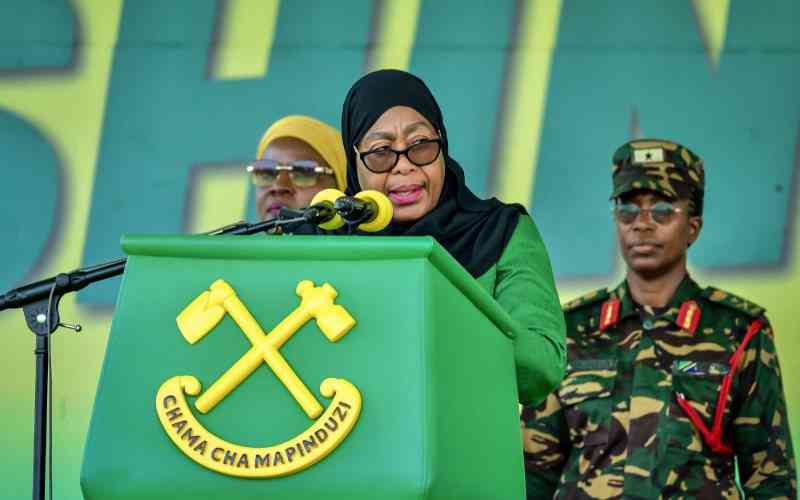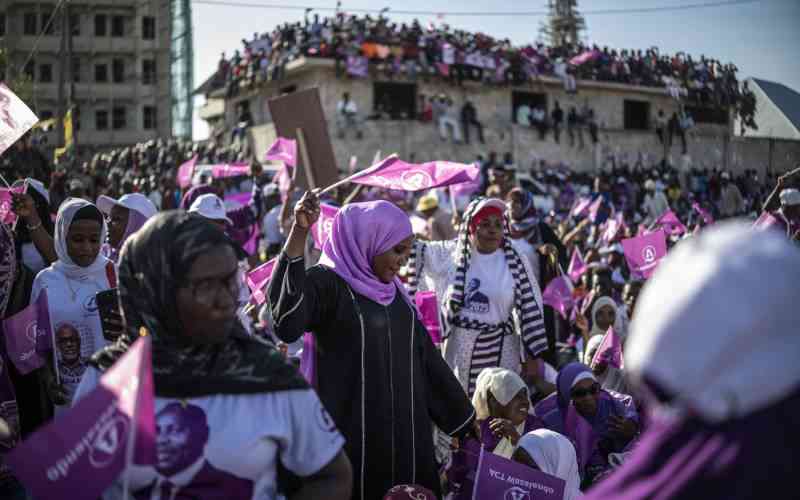Tanzania's Democracy in Crisis: Disputed Election Sparks Widespread Condemnation and Violence

Tanzanian President Samia Suluhu Hassan was inaugurated for her second term following an election widely denounced as a sham by the opposition and international observers, marked by widespread violence, an internet blackout, and significant irregularities. The ceremony, held at a military parade ground in the capital Dodoma and closed to the public, saw Hassan declared the winner with an improbable 98% of the vote. Her main rivals were either imprisoned or barred from competing, leading to a largely uncontested election.
The electoral process and its aftermath were characterized by severe repression. Since election day, a nationwide internet blackout has been in effect, severely hindering the flow of verifiable information and making it difficult to ascertain the true death toll from protests. Opposition leaders and activists claim hundreds were killed in clashes with security forces. The main opposition Chadema party reported no less than 800 deaths by Saturday, while diplomatic sources cited credible evidence of at least 500 fatalities. The UN human rights office confirmed at least 10 deaths in three cities, though the government has consistently denied accusations of using excessive force.
Prior to the vote, rights groups accused President Hassan's government of overseeing a "wave of terror," including high-profile abductions and arrests of opposition activists. Despite a heavy security presence, election day descended into chaos with crowds taking to the streets, attacking polling stations, and tearing down posters. Polling stations were reportedly largely empty before the violence erupted, contradicting the electoral commission's declared turnout of 87%. Schools and colleges remained closed, and public transport halted as cities like Dar es Salaam experienced near-total lockdowns with intense police scrutiny.
International bodies and regional organizations have expressed grave concerns. UN chief Antonio Guterres was "deeply concerned" by reports of deaths and injuries. Pope Leo XIV called for prayers for Tanzania, urging an end to violence and a pursuit of dialogue. The Mo Ibrahim Foundation condemned the ongoing violence and repression, warning that the government's actions threaten democracy, peace, and investor confidence. The Foundation noted a "dangerous regression" from democratic progress, especially after Hassan was initially welcomed as a reformer following her predecessor John Magufuli's authoritarian rule. They highlighted the banning of opposition parties, internet shutdowns, and the violent crackdown on protesters as unacceptable betrayals of democratic principles.
The Southern African Development Community Electoral Observation Mission (SEOM) delivered a rare and sharp rebuke, concluding that the 2025 General Election "fell short of the requirements of the SADC Principles and Guidelines Governing Democratic Elections." The SEOM identified 13 critical issues, including an intimidating political environment, restrictions on electoral justice preventing court challenges to presidential results, a compromised Electoral Commission appointed by the president, the internet shutdown which hampered observation efforts, harassment of observers, media censorship, low voter turnout alongside suspicious voting practices like ballot stuffing, and security overreach with reports of police firing guns. The mission's preliminary statement was delayed due to "security and communication challenges," underscoring the tense environment.
The controversial inauguration also drew criticism from within the region. Zambian President Hakainde Hichilema's decision to attend the ceremony was condemned by Zambian opposition leaders, including the People’s Alliance for Change (PAC) and the New Heritage Party (NHP). They argued that Hichilema, who himself ascended to power through a democratic process, legitimized a fraudulent election and undermined Zambia's reputation as a beacon of democracy. Critics pointed to Hichilema's past stances, such as skipping other contentious inaugurations, contrasting it with his attendance at an event where the incumbent secured an unbelievable 98% of the vote. Concerns were also raised about reports of 10 Zambian nationals potentially among those killed in the unrest near Nakonde, further fueling calls for Zambians to remain vigilant and defend their democracy.
Recommended Articles
Tanzania Erupts: Suluhu's Landslide Victory Sparks Widespread Protests and Regional Diplomatic Moves
&format=jpeg)
Tanzania has erupted in widespread, citizen-led protests following a contested election that saw President Samia Suluhu ...
Tanzania Election Chaos Unleashes Fear and UN Alarm

Tanzania’s 2025 general elections have spiraled into unrest marked by protests, killings, and a total internet blackout ...
Tanzanian President Sworn In Amidst Political Storm

Tanzanian President Samia Suluhu Hassan's second term inauguration has been marked by unprecedented political tensions a...
Tanzania's Bloody Aftermath: Allegations of Hundreds Killed, Opposition Arrested Post-Election
&format=jpeg)
Tanzanian President Samia Suluhu Hassan begins a second term amidst a contentious election marred by allegations of mani...
President's Power Shaken: Unprecedented Protests Erupt in Tanzania

Tanzania is experiencing unprecedented nationwide protests following the 29 October 2025 elections, met with severe repr...
You may also like...
Super Eagles' World Cup Showdown: Gabon Challenge & Squad Chaos Ahead!
)
The Super Eagles are preparing for a critical 2026 FIFA World Cup qualifying playoff against Gabon, with their camp open...
KPop Demon Hunters' Theatrical Disaster: A Flop at the Box Office and Bleak Sequel Hopes

KPop Demon Hunters, the hit animated Netflix feature, experienced mixed results with its recent theatrical re-release, d...
Tanzanian President Sworn In Amidst Political Storm

Tanzanian President Samia Suluhu Hassan's second term inauguration has been marked by unprecedented political tensions a...
WHO Unveils Major Clinical Trials Forum in Africa

The World Health Organization (WHO) has launched the Global Clinical Trials Forum (GCTF), a new multi-stakeholder networ...
Royal Family Turmoil: Expert Claims Eugenie and Beatrice's Bond with Sarah Ferguson 'Shattered'!

The close-knit 'tripod' relationship between Sarah Ferguson and her daughters, Princess Beatrice and Princess Eugenie, h...
Hollywood Legend Anthony Hopkins Sparks Fury: Labels ADHD and Asperger's as 'Nonsense'!

Sir Anthony Hopkins has ignited a controversy by calling ADHD, OCD, and Asperger's "nonsense," sparking strong rebuttals...
Kenya's Tourism Sector Erupts Over New KWS 'Hidden' Charges

The Kenya Tourism Federation (KTF) has strongly opposed new park-entry payment system changes by the Kenya Wildlife Serv...
Walk Away From Alzheimer's: New Research Pinpoints Key Daily Steps to Slow Progression

Promising research indicates that achieving a daily step count of 5,000 to 7,500 steps can significantly delay cognitive...